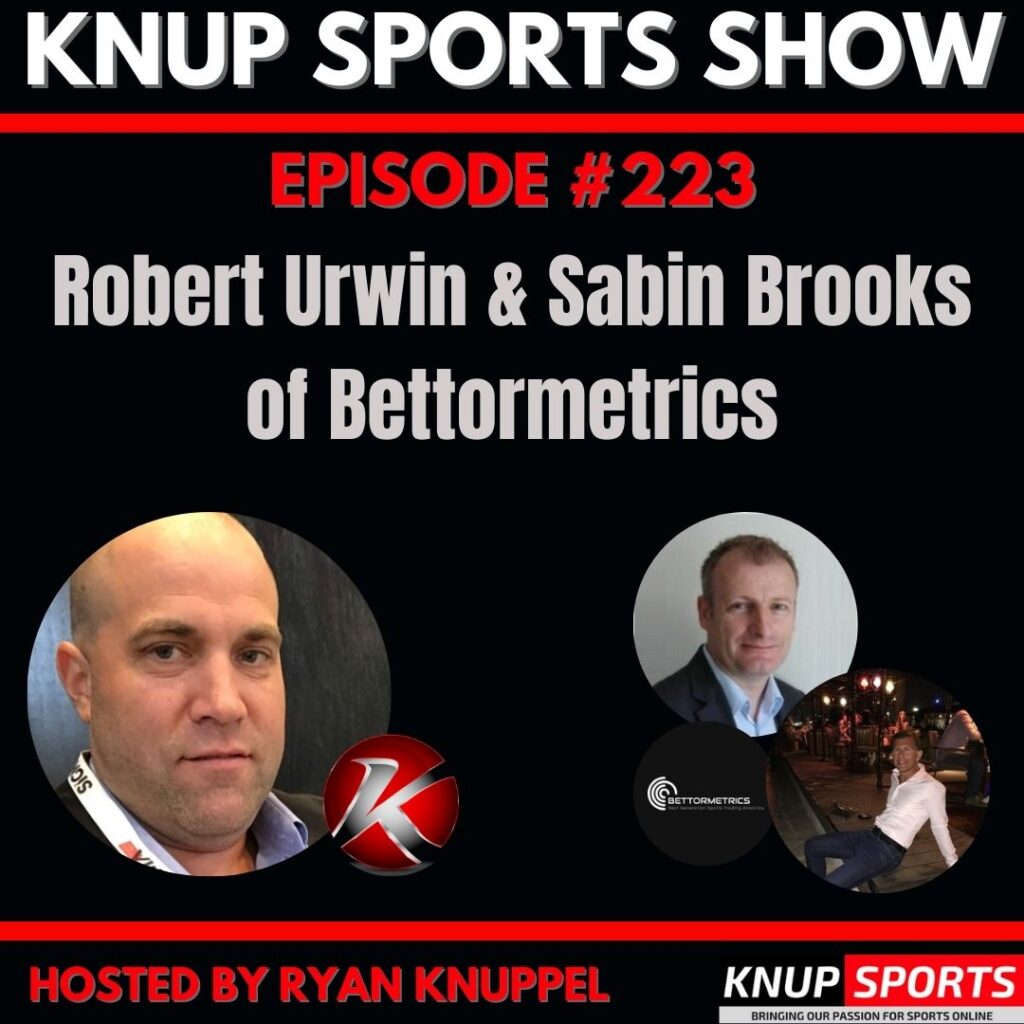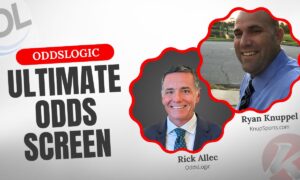In Episode 223 of the Knup Sports Show, host Ryan Knuppel chats with Robert Urwin and Sabin Brooks from Bettormetrics. They explain how Bettormetrics uses data and numbers to help sportsbooks (places where people bet on sports) run better. The episode talks about common problems sportsbooks have, like handling price changes and knowing when to stop taking bets, and how Bettormetrics helps fix these issues.
They also talk about sports betting in different parts of the world, especially the US and Europe, and how different companies react to new ideas. Urwin and Brooks share their experiences from working in both direct-to-customer and business-to-business roles, and they explain how using big data can make sportsbooks work better. This episode is helpful for anyone in the sports betting industry who wants to learn how to improve their business using data.
Watch the Show
Listen to the Podcast
Ryan Knuppel
Hey, what’s going on, everybody? Ryan Knuppel here, episode 223 of the Knup Sports Show. Thank you so much for paying attention and listening and tuning into our show. Hopefully you’ve enjoyed this week. We’ve had a number of shows this week, 221, 222, and now 223. So we’re excited for that. I’m excited to bring you the guests today. Typically we have one guest, but today we’re blessed with two individuals that are going to share their story and share their company as well. Super excited about that.
First off, I know a lot of you are conference goers. I actually met these two individuals that I’m going to introduce you to at the last SBC conference. Real quickly, I want to talk about the upcoming SBC conference called the Canadian Gaming Summit. It is June 18th to 20th. If you guys don’t have your ticket yet, please use Nuke Partner VIP. That’ll get you a little discount. We’re media partners for the show, so it will give us a little credit for the show as well. Please use that if it would help you get attendance to that there in Toronto. It should be a pretty cool show. We had a booth there last year. It was a neat show. It was a different audience, and going to Toronto was pretty cool as well.
All right. That’s enough housekeeping for one show. Let’s go ahead and jump right into the show and bring on our guests. Let’s see who we got today. Today, we got Robert Urwin and Sabin Brooks, both of you here with Bettormetrics. How are you two individuals? Doing well?
Robert Urwin
Doing well.
Sabin Brooks
All good. Awesome. Very pleased to be here. Thanks, Ryan.
Ryan Knuppel
Welcome to the show. Really appreciate you being here, and I’m excited to dive in and learn more about you guys and Bettormetrics. I know we got to sit down at the recent event, so I have the background, but the audience doesn’t. So how’s everything going? I know one of you are in London. Are you both in London?
Robert Urwin
I’m in West Berkshire, which is about sort of 50 miles outside west of London.
Sabin Brooks
I’m in London itself. I’m in West London, a place called Ealing.
Ryan Knuppel
Okay. Okay. Awesome. Awesome. I’ve never been to London, so I’m a little jealous, especially right now when it’s like 98 degrees every day in Orlando, Florida.
Sabin Brooks
This is the time to come to London because this is when we get into, it’s not only the best time to visit, it’s when we have all the major sports events as well. So it’s obviously Wimbledon is coming up. You have the Henley Regatta, you have the Formula One, you have the British Open. So we have the Champions League one on the weekend. It’s really the best time to be in London. We don’t get to say that many months of the year.
Ryan Knuppel
Very cool. Very cool. Awesome. Well, let’s jump right in. I want to learn a little bit about you guys before we jump into Bettormetrics. So, Robert, why don’t you start? Tell us a little bit about your background and then Sabin can jump in and somehow figure out how to connect the two of you to where you are today. So, Robert, why don’t you go ahead and start?
Robert Urwin
Sure. Okay. So I started my career as, I guess, as a software engineer at Vodafone many years ago, left that in 2006 and set up my own gambling company, BetNow. So that gave me a taste of startup and sports book industry. We ran an innovative play around mobile and ran our own book, which was a very interesting experience for me and got me into the sort of understanding the dynamics of putting together a sports desk. So I then went on from there to consult around the industry a bit. I worked with Unibet and Lab Brooks and did bits and pieces around Betfair, the exchange. I was very interested in how the exchange was producing some very interesting lines and insights into the industry in general and got involved in the trading community there.
So I set this business up with a co-founder at the end of 2021. Our principal objective was to build some new technology around analytics and insight for the sports desks. And we’re going to be talking about that a fair bit more, I’m sure.
Ryan Knuppel
Amazing. Awesome. Sabin, how about you?
Sabin Brooks
I’ve got a marketing background. I spent the first formative years of my career working in advertising, and then I became head of marketing for a company called Sky Sports, which is really our ESPN in the UK. Sky Sports was quite big into gambling. This was sort of the turn of the century. We launched Skybet, which was obviously owned by Flutter now that came from a company called Surrey Sports. I was then the group marketing director for Party Gaming when partypoker.com was the only poker game in town. And since then, I’ve done a number of consulting and startup roles within the industry. I had an affiliate marketing company that I sold. I advised casinos in New Jersey when it went live. I’ve helped Rob on a vertical bet now. And latterly, this new business. So I’ve been in this space a long time and very interested in all aspects of it.
Ryan Knuppel
That’s amazing. So both of you with your vast backgrounds and your lots of knowledge, how did the two of you meet? Let’s talk about that. Where did that connection come?
Robert Urwin
Crikey. Who wants to give that story? So Sabin and I originally met in 2011, end of 2008 I believe it was. Sabin was working at the time as the group marketing director for Party Gaming and I bumped into him and asked if he knew anybody I could talk to about marketing, being head of marketing for my startup business, BetNow. And as the story goes, Sabin liked it so much, he said, I’d like to get involved myself. And that’s how the union started between us. So we worked on that venture for about a year or so. And then we’ve had a community of friends in common and we’ve bounced a number of businesses between ourselves and always kept in touch. I don’t know if you want to add to that Sabin, I’m sure.
Sabin Brooks
No, I think what’s interesting about being in this space, and I’m sure, Ryan, you’ve met a lot of these people, is that you have some people who work for gaming companies most of their life and those that go and launch startups and take the risk themselves. And hats off to Rob. He’s got an engineering background from Vodafone, but this is his second startup. And it takes real cojones to go in and do that and risk your own capital and raise capital. And he’s done that very, very successfully. So I’ve had the benefit of working with some extraordinarily successful and wealthy people within the gaming space. And I think it’s more fun working on startups like Rob has brought from nothing to something that’s emerging as something good. So yeah, he persuaded me to work with him and we gave it a go and it’s second time around now. We’re both determined to make a success of this. And we think that big data and sports and the opportunity is quite ripe for disruption and growth and monetization.
Ryan Knuppel
Yeah. So let’s transition. Let’s talk a little bit about what’s next. Right. Bettormetrics. What you guys are up to currently. Why don’t you give me the thousand foot view of what Bettormetrics is, what you’re out to solve, who you’re out to help?
Robert Urwin
Okay, so I’ll start on that by saying so essentially the problem we’re looking to solve is all of those deficiencies that occur on the sports desk. So things around anomalous events and arbitrage and long suspensions all bookmakers have these problems. It’s evident and the trading communities I’ve worked with will always look to find those problems with bookmakers. And I felt that the software that was out there was not helping bookmakers to advance their processes to identify and improve on these things. So Bettormetrics is a big data service. We take data from many different sources, put it all together. We do a bit of transformation and linking up which is a difficult part so that bookmakers can view their data, their price points versus their key competitors and rivals. And so they can identify where, for example, their suspension is a lot longer than bookmakers that they would expect to be aligned with.
And through identifying those problems and working on them and offering a better proposition to the customer, they can ensure that they get the best turnover that it’s possible for them to achieve with the technology that they have in place.
Ryan Knuppel
That’s amazing. So talk about where you’re at in the cycle. I mean, are you launched? Are you working with operators
across the world? Are you focusing on certain geographic areas? Where are you at in terms of that?
Sabin Brooks
I think one of the problems that you encounter in this industry is that those that make the decisions about optimizing a sportsbook don’t necessarily know that there’s a problem. You know, I lost count of the number of times when I worked for Party Gaming and I worked for other organizations, but the training director comes and tells us the sports results have worked against us. It’s just been a bad month. We couldn’t help ourselves. And it’s just not true. You know, like you can manage that operation. Yes, sometimes sports results go against you, but a lot of these anomalies and deficiencies can be managed and can be removed. And that’s what this product does. So there’s a little bit of a challenge. We’ve got a great product. It could definitely be improved, but we don’t think there’s anything like it in the market. We think it would be incredibly well received. But there’s an element of defensiveness for trading directors who don’t want to be entirely transparent with their line managers, CEOs, COOs about where they are failing the organization and where turnover can be improved.
Ryan Knuppel
Yeah, I mean, I can relate to the phrase you kind of said, you don’t know what you don’t know. And data and reporting, you know, those two things really just help shed light on things that you may not know about your company. And like you said, whether you want to accept what it is, once you do know it, that’s a different story that we can talk about a different day. But yes, absolutely.
Sabin Brooks
I think the enlightened organizations recognize that failure is a part of progress. Other ones who are trying to keep their job and don’t want to embrace the concept of failure are much less open to our sales pitch and much less open to the idea of what we’re doing. The reality is that we’re a profit. We should be seen as a profit center. We make money for organizations. And the first reaction when you go and see businesses is you’re an additional cost. We need to change that perception.
Ryan Knuppel
Yeah. I mean, touch on that a little bit further. I mean, it’s probably a loaded question actually. And I’m sure the answer is not a one-all answer, but I was going to say, I mean, how much money can a sportsbook save by just sometimes knowing some of these issues? I mean, I’m sure you’ve seen some use cases of amounts of money saved through just knowing some of this stuff. Can you shed some light on any numbers or any kind of ideas?
Robert Urwin
Absolutely. I mean, it’s really quite shocking. We haven’t seen a bookmaker yet, and we’ve looked at all the principals in America and Europe, and many in Asia as well, who couldn’t make very large improvements. We see suspension in some cases is causing issues as big as 10% of their entire turnover. Arbitrage is again a huge problem in the industry. Particularly with the popularity of American sports now, those sports tend to, the price point moves around a hell of a lot and for all the bookmakers to keep in check, it’s very difficult. Arbitrage is exploited by very large cohorts of sharps, and it’s costing bookmakers millions, if not tens of millions in terms of handle.
Ryan Knuppel
Wow. So major money we’re talking here, major money.
Sabin Brooks
I think it’s major money, but the interesting thing is it flies under the radar because the majority of the media and the majority of the coverage tends to be around acquisition costs as operators extend themselves into new states. What’s the cost of paying affiliates? What’s the cost of bonusing? What’s the cost of retention? All of these are seen as costs that need to really actively be and cleverly manage both short-term and long-term. Whereas the trading costs and the management of those costs and the optimization improvement of profitability, it just isn’t covered in the same way. And that’s what we’re seeking to do really.
Ryan Knuppel
So how do you break through that mentality with operators? I mean, how do you break through and really encourage them or tell them that this is such a big deal that they do need to look at that? I mean, how do you break through that barrier? That has to be a major barrier for you. How do you break through it?
Sabin Brooks
I think initially you think you do things politely and you explain things rationally and logically. And you hope that people buy your pitch, but the reality is they don’t. So I think we’re moving more towards a name and shame, which is we have no attachment to who does it well and who does it badly. We just, our only attachment is to the data. And so when we go and speak to companies and say market-leading companies, who you think are very good at what they do, and they are very good at what they do, they’re also receptive when you explain to them, this is the data that we see. And we’re talking, you know, tier one operators in America, two or three out of a list of DraftKings, Fangio, Bet365, Caesars will have these problems and are receptive to it. And I hope will buy our service long-term.
Their initial reaction, obviously, is we’ve got this covered. We know about these things and we’ve got the tools that we can do this in-house. And the two things are generally not true. Generally, they don’t know what they don’t know. And secondly, they can’t just build these tools very, very quickly and do it the same way or as cost-effectively or as qualitatively as Bettormetrics can do it. They have got their focus on too many other things to do this well.
Ryan Knuppel
Yeah, I can add to this as well. I mean, historically, a lot of bookmakers, you know, what went on on the trading floor is a bit of a dark art, whether a competition has been traded well or not would really just come down to opinion because you can trade a competition extremely well and still make a loss. It’s quite possible for that to occur if the favorites come through and win everything, then it’s quite possible that even an extremely well-run sportsbook will make a loss. So there’s a bit of a, how do you track and measure these things? And I guess where we come along is at the sort of crossroads between the technology and the insight you can get from being able to compare multiple lines all at the same time in play and you can see the price point for every bookmaker and they’re over round second to second and you can see how they’re reacting to events using a service like ours.
We have this Bloomberg-type terminal that enables you to have that deep insight moment to moment as to how the trading floor are performing and you would be surprised at some of the mistakes that trading floors make. For example, if they become unsure about a set of circumstances, the natural reaction is to hit the suspend button because, hey, you know, we’re not going to make a loss while we’re suspended. So let’s just suspend and wait for this moment to pass. And that might be, you know, an unexpected sending off or it might be a touchdown that went against the run of play. And, you know, have they got a kicker on the field who can do something, put some more points on the board? So traders will tend to their first reaction will be to suspend. But I mean, that’s not necessarily in the business’s interests. The uptime, as we’re now discovering, is really important. Punters out there want to keep betting. They expect that their sportsbook is going to be up and running and offer good value at all times. And that unfortunately is not the case when you analyze the statistics.
So we provide forensic tools that enable bookmakers to look at all of those key moments versus their key competitors and identify those deficiencies and understand what belies them and how they can improve things.
Ryan Knuppel
So what regions are you guys focusing on in terms of operators? I mean, I know you have extensive experience in the UK. Obviously, you just came to the US conference and have talked a little bit about the US. So assuming you’re busting into that market as well, but talk a little bit about your regions. And maybe as a separate question, maybe some differences you’re seeing in some of the regions between how the operators feel about this type of thing or how they react to this type of thing.
Sabin Brooks
I think the reality is that we offer a premium product which lends itself to the bigger operators. So I don’t think the geography is necessarily that important, but a tier one operator in the US and a tier one operator outside the US is the kind of customer that’s most likely to want to work with us. Obviously, we’re oriented around the big sports. So in Europe, soccer tends to dominate, NFL dominates, and you’ve got a certain number of sports like tennis in Europe that will follow, and obviously NBA and NHL and things like that that follow. So it isn’t so much around the geography that’s important. It’s around organizations. I kind of think that trading, as Rob sort of talked about, and those who’ve been working in trading organizations, especially in Europe because it’s a much older game over here, they tend to think of it as an art rather than a science. And undoubtedly it is about finding the right the sweet spot between
risk management and maximizing turnover between best price and managing sharp hunters. And we recognize it’s a balancing act, but there can be a more scientific approach by understanding the data and making the improvements with the data that our service offers.
What’s interesting if you focus on the geography is I think the American market is more receptive to it because you tend to be, if you turn on the TV in America versus turning on the TV in London, there is so much more data, stats, and analysis in all your sports programs. It’s just much more embedded in the American way of doing things. I think that’s helpful for us in trying to sell our products stateside. But we’re definitely focused as well on the big European sportsbooks, global sportsbooks, as well as the American ones too.
Ryan Knuppel
Amazing. Thank you for that. As you guys head into the future here, what’s the future of Bettormetrics look like? I mean, continuing to grow out the functionality of what you guys are doing, any big plans for the future? Talk a little bit about your future growth plans and things of that nature.
Robert Urwin
Well, as we described, we want to work with large progressive organizations who are data-driven. It’s our job to provide analytics to help those quantitative teams who are looking to provide the best services in the market for the customer and for their company to provide the analytics that free them up so that they can get on with the hard maths and the engineering to make sure that they’re delivering the best service. And our analytics sits side by side with that to provide them with that insight as to how their performance is going on. We already work with several large organizations. We would hope to add many more to that, and we are slowly progressing the product into monitoring services and potentially some real-time services are being designed at the moment. We’ve one or two large companies who are sponsoring a couple of projects and we’re expecting to bring those to market in the coming months.
Ryan Knuppel
All right. Thank you for that. So I want to shift gears a little bit and go a little bit away from talking about the product and talk a little bit more about business in general. Because I know you guys have kind of wide, vast experiences across different business verticals. I know Sabin, you did some work in the affiliate space, which is really B2C focused, if you think about it. Now what you’re doing is really very B2B. Tell me a little bit about your experiences working in the B2B space. And how is that? Do you like it compared to B2C? Just give us some, I guess, ups and downs of that world compared to the B2C world, because it’s vastly different. I’ve worked in both. It’s a vastly different business mindset as business owners and business operators. Talk a little bit about those differences.
Sabin Brooks
Sure. I mean, my background, I’ve worked B2C. Like I was a marketing director for Party Gaming with Party Poker. I don’t know if you remember when Party Poker was very, very big in America and getting around with their .NET websites. We had all kinds of initiatives which were B2C. I did the same with Sky Sports in the UK. Building that relationship directly with the customers is a totally different challenge. Working in the affiliate space is super, super interesting. And I think when you think about the companies that are doing well in the gaming space in America, yeah, you hear about DraftKings and you hear about FanDuel and you hear about these struggles, but some of these affiliates like Better Collective, for example, that are large and have deals with, have bought out some of these big websites and making huge amounts of money. There’s no risk to them. They don’t have to monetize the players when they come in. They literally get paid a large bounty by big casino and sports betting operations globally and they do very, very well out of it. So I mean affiliates are traditionally very, very entrepreneurial. They’ll find a way to market in a way that larger organizations can’t. That’s the role that they play. So it’s an interesting space to be in. There’s good money to be made. Whereas I think doing B2C marketing is much safer. It takes longer. It’s much more social. But B2B is challenging because there’s only a certain number of customers. You have to find what the sweet spot is with them. Typically, you need three or four or five great advocates of your service to help you develop it. And then you find that long tail and you do really well out of it. But I think B2B in some ways is more challenging because once you’ve got a product that does quite well in the marketplace, you iterate and you improve on it. But it’s more difficult at times and you have lower budgets as well. So it’s challenging.
Ryan Knuppel
Yeah, great insight there. I mean, I feel the same way about that sometimes, right? It’s tough at first, and then once you do have the big advocates, then it becomes a little easier. So it’s one of these curves that you have to go through. Interesting. I could talk business all day long with you guys, but for lack of time, we’ll keep going here.
So what’s I guess what’s one current challenge that you guys are facing from a business side? What’s one challenge you’re facing? And potentially those listening, you know, we have a lot of business professionals listening to this show. What’s one challenge that maybe somebody could help with or that you’re just looking for help with that maybe somebody could address on the show?
Robert Urwin
I guess quality of data is one of the things. It’s a big challenge for us and for the entire industry really is to get hold of quality data points. And then a big aspect of our service is what we call the linking engine, where we take data from many different aggregators and sources and link it up into one common, if you like, data tree. So you can identify that Man City on one book is Manchester City on another and many other variations thereof. And linking up all that data and getting the times and the time zones sorted and all stuff like that. I think if there were more companies out there that provided those sort of services, I think it would be a huge aid to analytics in general. That’s one of the barriers to being able to produce meaningful insights. It’s very often clients will come to us and ask for particular markets, like, for example, Brazil. We’ve had a number of clients ask if we can help with some analysis there. And it’s very hard to find well-scraped data that is, shall I say, manageable so that you can link it up properly and garner the insights.
Sabin Brooks
When you said it, Ryan, I, funny enough, I started thinking about the Pepsi challenge. And what I mean by that is if you remember that most people aren’t old enough to remember the Pepsi challenge that, being open to the idea that what you’re currently drinking isn’t quite as tasty as you think. I’ve done it with my son. Actually, I’ve got the Coke and the Pepsi and I’ve said, well, we’re going to do a blind taste test and see which one you like better. And he’s like, no, no, no, I don’t need to do it. I like the red one. He’s already made up his mind. He’s never tasted it. And actually, when you do it, he prefers the Pepsi. And I sort of feel like that’s our challenge in the sports betting industry. People don’t think that they need to change the way they’re doing it. It tastes fine or they think it tastes fine. But actually, if they were open to the idea of experiencing this product and being open to the idea that they might make quite a lot more money if they used it and they might not get the sack for doing it is kind of where we’re at as a business because I’m convinced that we’ve got something that’s useful. Yes, we could definitely make it more useful, usable, useful, extensible in terms of the way that traders use it, but I do think they’re drinking Coke and we have Pepsi here which might be better for them and they might like it more ultimately.
Ryan Knuppel
That’s a great analogy. I love that. And I am old enough to understand the Pepsi challenge, I think. So I don’t know if that’s good or bad, but I do know and can relate to that.
Sabin Brooks
I remember when you said you love business, I think someone said to Warren Buffett, if you gave him $100 billion to try and create a competitor to directly compete with Coke and beat them, he’d give you the money back and say it’s not possible. It’s incredible how embedded they are.
Ryan Knuppel
Once you build that brand, right, the brand is everything. Once you’ve built that reputation and that brand, it’s hard to beat that no matter what you do with the product. Sometimes it’s crazy. It’s crazy.
I think DraftKings are doing they’re doing a similar thing in America. They really are investing in the products and the reputation. And I think hoping, believing that this big upfront investment in the debt that they’ve taken on will pay dividends in the long term. We’ll see.
Ryan Knuppel
All right, guys, any last words, anything we missed? I’m going to let you guys go here pretty soon. But anything you guys wanted to touch on that maybe I didn’t leave?
Robert Urwin
I’ll just add to Sabin’s point there. I mean, we can uniquely see why DraftKings are the best in market presently. We can see their minimalist approach to suspension time. They’re going flat out to have the highest uptime and they’re head and shoulders above everybody else at the moment. We can also see uniquely how their over-round is being flexed depending on the uncertainty of particular moments in things like NBA and NFL. You can see that they are changing and developing season to season their pricing strategy. And I think more companies should have the tooling to be aware of this and to understand what their competitors are doing. We really want to work with progressive groups who want to take on that challenge and become a lot more competitive in this space.
Sabin Brooks
Yeah, I was just gonna say, I mean, anyone who sees this wants to reach out to any of us, even if it’s just an exploratory conversation. Even if they’re not serious about having the budget now, they want to understand the space a bit more. We’re happy to speak to anyone and would welcome those introductions and those conversations, because we think it’s going to take time. But ultimately, tier one, tier two, tier three companies are all going to want to exploit big data in the way that all industries are. Sports betting is no different.
Ryan Knuppel
What’s the best way to contact you guys or get ahold of you guys? What avenue would you send people through?
Sabin Brooks
You can find us on LinkedIn. I mean, our names are here. I mean, our email address is our first name dot surname at bettormetrics.com or LinkedIn. We’ll respond to both of those ways.
Ryan Knuppel
Amazing. Awesome, guys. Well, any last words, anything we missed? Speak now or forever hold your peace. Anything you wanted to say before I let you two go?
Robert Urwin
Thanks for hosting us. It’s been really good talking to you. Thanks very much for the opportunity to talk to you about this space and give you a bit of insight as to the problems that we’re trying to solve.
Ryan Knuppel
It’s been my pleasure, guys. Really wish you the best of luck, and I’m excited to see where you guys head. And hey, we all want the books to be better, and this is one way to help them be better, right? And so I’d encourage any operator out there, anyone working with operators to get a hold of these two and let them explain how they can help through data and reporting and transparency at the end of the day. All right, guys. Well, appreciate you all. Thank you. Take care, and we’ll talk to you soon.
Ryan Knuppel
All right. That was the Bettormetrics crew, episode 223. We’re moving on up there, having some fun, doing podcasts. Hopefully you enjoyed that one, talking some of the serious issues going on with operators and things that they can address and just do better, right? I mean, in business, we all want to do better. And sometimes we don’t want to admit that we can do things better, but you always can. And so some of the stuff Bettormetrics is doing really sheds light on that for operators. So be sure to reach out to those guys. Check out. They’re really cool dudes. I got to meet them in person at SBC in New Jersey. That was amazing. Looking forward to that in the future for other events as well. But make sure you say hello to those two and learn what they can do for you if you’re in the operator space.
All right. I think that’s it for episode 223. I’m Ryan Knuppel. You can find me on all the social channels. I’m always on LinkedIn. Shoot me a message out there. If you have anyone you want on this show, please let me know. I’d be happy to bring them on, talk about what they’re up to as well. All right. Take care. Stay safe. We’ll talk to you soon. Bye-bye.

Relevant Guest Links
- Learn more about Bettormetrics on their website.
- You can connect with Robert Urwin and Sabin Brooks on LinkedIn.
More Knup Sports Links
- I refer to Knup Sports often in my show. That’s our sports passion site. Check out KnupSports.com here.
- If you are looking for sports content services you can find more information on the Knup Solutions website.
- Listen to more episodes of the Knup Sports Show.
- Want to be a guest on our show? Setup a time that works here.
- Subscribe to the Knup Sports Show on iTunes here.









